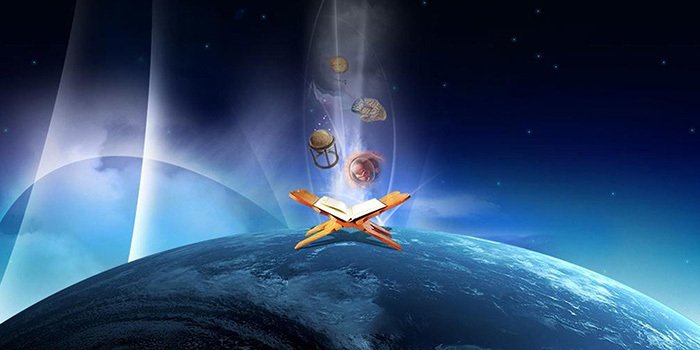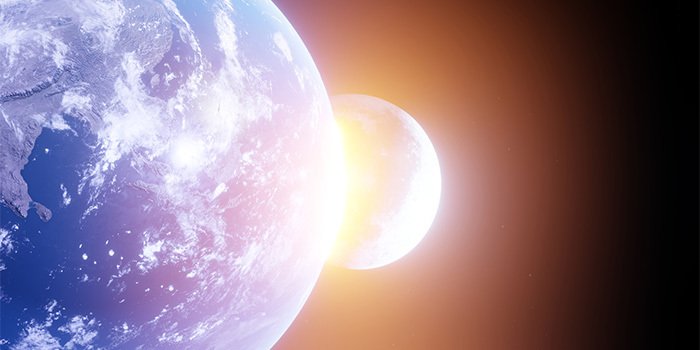When the Heart Feels Heavy
Oct 29, 2025

Explore the scientific miracles in the Quran that showcase Allah’s creation. Learn how nature reflects divine wisdom through Islamic teachings and science.
Have you ever gazed at the stars and felt a sense of awe? Or marveled at the intricate design of a butterfly’s wing? It’s easy to look at these sights and quickly forget about them. These wonders of nature aren’t just beautiful, they’re also powerful signs of Allah’s (SWT) creation, pointing to the perfect harmony between faith and science in Islam.

The Holy Quran, revealed over 1400 years ago in an era with little scientific understanding, contains numerous verses that align perfectly with today’s scientific facts and discoveries. This remarkable connection between Quranic miracles and scientific knowledge strengthens our faith and deepens our appreciation for Allah’s (SWT) wisdom.

Far from being at odds, Islam and science work together to help us understand the magnificence of Allah’s (SWT) creation. The Quran encourages believers to observe and reflect on nature’s blessings, promoting scientific inquiry as a way to increase our faith. As we delve into these scientific and spiritual miracles, it’s important to contemplate the reasons behind their existence, examining them through both an Islamic and scientific lens.
The Islamic Golden Age, which occurred from the 8th to the 14th centuries, was a period of enlightenment and scientific breakthroughs. During this era, Muslim scholars embarked on a quest for knowledge, leading to ground-breaking innovations in fields such as astronomy, mathematics, medicine, and chemistry. Their curiosity was directly inspired by Quranic teachings to seek wisdom and understand the world around them. Their discoveries paved the way for significant advancements in the world of science, some of which revolutionized the way people looked at the world.
The Holy Quran is filled with verses about nature and its subtle perfections, inviting us to observe Allah’s (SWT) handiwork in the world around us:
Each of these natural phenomena serves as unforgettable signs of Allah’s (SWT) existence and His flawless design, enabling us to embrace Islam in all its beauty.
Exploring scientific miracles in Islam can have a profound impact on our faith. By witnessing the perfect alignment between Islamic revelation and scientific discovery, our faith is strengthened through:
At Darussalam, we’re committed to helping you explore the divine miracles of Islam through our collection of authentic Islamic books. From Quranic exegesis to modern scientific interpretations, our carefully curated selection offers valuable resources for those seeking to understand the perfect harmony between Islamic teachings on the universe and scientific discovery.

Throughout history, Islam and science have mutually enriched each other. Despite the common misconception that Islam and science are opposing entities, Islamic teachings have consistently encouraged scientific inquiry and exploration.
From its earliest days, Islam has promoted the pursuit of knowledge as a fundamental principle. The Prophet Muhammad (peace be upon him) said, “Seeking knowledge is obligatory upon every Muslim.” This command didn’t just inspire individual learning, it sparked a vibrant culture of learning that would shape the Islamic and scientific world for centuries to come.
Early Islamic scholars embodied this exact spirit of curiosity:
These pioneering Muslim scholars and countless others saw no conflict between their faith and scientific discovery. Instead, they viewed their research as a way to better understand Allah’s (SWT) creation and strengthen their connection with their Creator.
The Holy Quran itself encourages exploration and learning. Several verses highlight the importance of observation and reflection:
“And in yourselves. Then will you not see?” (Quran 51:21)
This verse invites believers to look within themselves and the world around them, fostering a spirit of inquiry and open-mindedness.
The period known as the Golden Age of Islam saw remarkable advancements across diverse scientific fields:
These contributions did more than advance human knowledge; they demonstrated the harmony that naturally exists between Islam and science, fulfilling the Prophet’s (peace be upon him) command to all Muslims.

The Quran contains a number of verses that align with modern scientific knowledge, serving as powerful evidence of Allah’s existence and the divine nature of the Quran.
One of the most striking examples of Quranic miracles relates to the origin of the universe:
“Have those who disbelieved not considered that the heavens and the earth were a joined entity, and We separated them and made from water every living thing? Then will they not believe?” (Quran 21:30)
This verse, revealed over 1400 years ago, aligns remarkably well with the modern Big Bang theory. It describes a state where the universe started as a single point before being separated – a concept only confirmed by science in the 20th century.
Another fascinating scientific sign in the Quran relates to the expansion of the universe:
“And the heaven We constructed with strength, and indeed, We are [its] expander.” (Quran 51:47)
This verse points to the expanding nature of the universe, a fact not discovered by scientists until the 1920s when Edwin Hubble provided observational evidence for cosmic expansion.
Stages of Human Development
The Quran provides a detailed description of human embryonic development:
“We created man from an extract of clay. Then We made him as a drop in a place of settlement, firmly fixed. Then We made the drop into an alaqah (leech, suspended thing, and blood clot), then We made the alaqah into a mudghah (chewed substance)…” (Quran 23:12-14)
Modern embryology has confirmed the accuracy of this Quranic description. Dr. Keith Moore, a prominent embryologist, noted the precision of the Quranic account in his book “The Developing Human”. He stated that the Quran’s description corresponds exceptionally well to our current understanding of embryonic development stages.

The Quran accurately describes the water cycle:
“It is Allah who sends the winds, and they stir the clouds and spread them in the sky however He wills, and He makes them fragments so you see the rain emerge from within them…” (Quran 30:48)
This description aligns perfectly with our modern understanding of the water cycle. The Quran explains how winds drive clouds, how clouds condense to produce rain, and how rain replenishes groundwater – all key components of the hydrological cycle as we understand it today.
The world around us is filled with signs of Allah (SWT) in nature, each illustrating His infinite wisdom and All-knowing power. The Quran repeatedly draws our attention to these signs, inviting us to reflect on the wonders of creation.
Allah’s (SWT) perfect design is evident in the delicate balance of ecosystems. The Quran speaks to this balance:
“He Who has created seven heavens in full harmony with one another: no fault will you see in the creation of the Most Gracious. And turn your vision [upon it] once more: can you see any flaw? Yes, turn your vision [upon it] again and yet again: [and every time] your vision will fall back upon you, dazzled and truly defeated.” (Quran 67:3-4)
This verse encourages us to observe the harmony in nature closely. Modern ecology confirms the intricate balance in ecosystems, where each element plays a crucial role in maintaining the entire system.

The Quran describes mountains in a way that fits in perfectly with modern geological understanding:
“Have We not made the earth as a wide expanse, and the mountains as pegs?” (Quran 78:6-7)
Modern geology has revealed that mountains indeed have deep roots that stabilize the earth’s crust, much like how pegs stabilize a tent. This scientific fact in the Quran showcases Allah’s (SWT) wisdom in Earth’s design, from the intricate details to the entirety of His creation.
Another fascinating sign of Allah’s (SWT) power is found in the behavior of bodies of water:
“He released the two seas, meeting [side by side]; Between them is a barrier [so] neither of them transgresses.” (Quran 25:53)
This verse describes a phenomenon only recently understood by oceanographers – the existence of physical barriers between different bodies of water. For example, the Mediterranean Sea’s water remains distinct from the Atlantic Ocean due to differences in density and salinity.
The Quran often points to natural phenomena as signs of Allah’s (SWT) mercy:
These everyday occurrences, often taken for granted, are presented in the Quran as clear evidence of Allah’s (SWT) existence and His compassion for His creation. Allah (SWT), also called Ar-Rahman (The Most Merciful), wants His servants to know that He is always present and that His mercy is as boundless as His creations.
Islam has long been a catalyst for scientific inquiry and discovery. The Quran’s emphasis on seeking knowledge has inspired generations of Muslims to explore and understand the world around them.
The Quran repeatedly urges believers to observe and reflect on the universe:
“Indeed, in the creation of the heavens and the earth and the alternation of the night and the day are signs for those of understanding.” (Quran 3:190)
This verse and many others like it encourage a spirit of curiosity and investigation, laying the groundwork for scientific inquiry within an Islamic framework.
Inspired by Quranic guidance, Muslim scientists have made significant contributions to various fields of study:
Astronomy:
Mathematics:
These scientists and many others exemplify how Islamic teachings on the universe can inspire scientific advancement. They saw their work as a way to better understand Allah’s (SWT) creation, emphasizing the intersectionality of Islam and science. Through their hard work and strong faith, they advanced the world both spiritually and scientifically.

Discovering the scientific miracles in Islam can profoundly impact our faith, deepening our connection with Allah (SWT) and enhancing our understanding of His creation.
The Quran repeatedly encourages us to reflect on the wonders of the universe:
“Indeed, in the creation of the heavens and the earth and the alternation of the night and the day are signs for those of understanding.” (Quran 3:190)
By contemplating Allah’s (SWT) creation, we:
This reflection isn’t just an intellectual exercise – it’s a spiritual journey that brings us closer to our Creator.
In Islam, seeking knowledge is a form of worship. By studying the natural world, we’re essentially studying Allah’s (SWT) handiwork. This perspective transforms scientific inquiry into a deeply spiritual activity.
Consider the following hadith:
“The seeking of knowledge is obligatory for every Muslim.” (Ibn Majah)
This directive encompasses all beneficial knowledge, including scientific understanding. When we approach scientific study with the intention of better understanding Allah’s (SWT) creation, it becomes an act of worship.

Today’s Muslims have a unique opportunity to bridge faith and science by:
By engaging with science through an Islamic lens, modern Muslims can explore the world, serve humanity, and strengthen their faith simultaneously.
As we’ve explored throughout this article, the wonders of Allah’s (SWT) creation are evident in both the natural world and the scientific miracles described in the Quran.
The continuous harmony between scientific discoveries and divine wisdom revealed in the Quran is a testament to the timeless nature of Allah’s (SWT) message. As believers, we’re encouraged to pursue knowledge, explore the world around us, and use our understanding to benefit humanity and draw closer to our Creator.
“Read in the name of your Lord who created – created man from a clinging substance. Read, and your Lord is the most Generous – who taught by the pen – taught man that which he knew not.”
(Quran 96:1-5)
These verses, the first revealed to Prophet Muhammad (peace be upon him), beautifully encapsulate Islam’s emphasis on knowledge and learning. They remind us that every scientific discovery is an opportunity to marvel at Allah’s (SWT) creation and strengthen our faith.